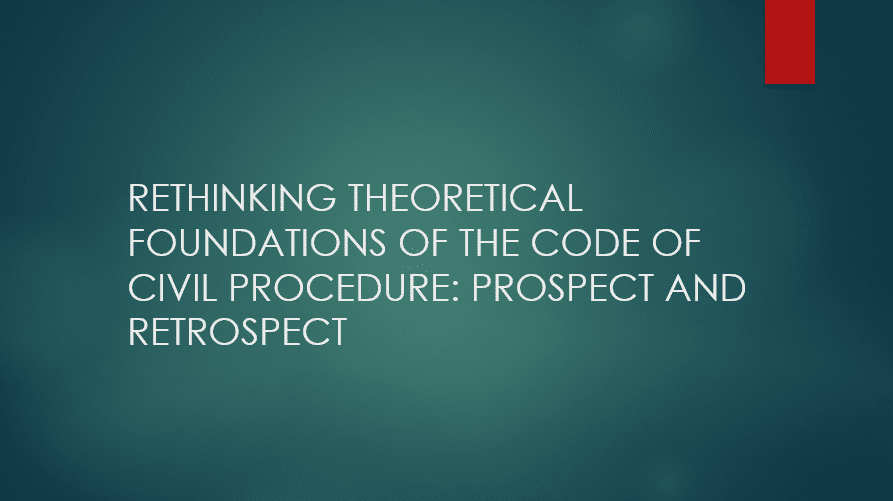Law of civil procedure plays a crucial and pioneering role in expanding the adjudication of civil disputes. The contemporary tendency, however, is to treat the procedural law as subordinate to substantive law.
These issues that we will deal with are:
- Whether law of civil procedure is an adjective law?
- What are the object, scope and extent of applicability of the Code?
- How the Code is to be interpreted?
- Whether the Code should have retrospective operation?
It is important to rethink the theological foundations of the code of civil procedure because the procedural law as we know it by nature cannot be laid down extensively and exclusively. However carefully drafted, there will be situations when the code does not envisage a clear path forward. It is then the interpreters of law will be inclined to rethink the foundations of the CPC, take up a much more liberalized view and extend its provisions keeping in mind the legislator’s intent and to do justice at any cost as duty bound.
Whether law of civil procedure is an adjective law?
Procedural Law or Adjective Law deals with the enforcement of Law that is guided and regulated by the practice, procedure and machinery. In other words, procedural law is the collection or aggregate of the rules of procedure. To provide some context, Substantive laws are laws that creates or governs the rights and obligations of Individuals and entities and on the other hand, procedural law lays down the procedure of enforcement of those rights and obligations. It is thus said that procedural law is subordinate to substantive law.
The objects of the code of Civil procedure clearly states, “An Act to consolidate and amend the laws relating to the procedure of the Courts of Civil Judicature” thereby it inherits the core functionality of a procedural law.
What are the object, scope and extent of applicability of the Code?
The preamble to the CPC provides that it is an Act to consolidate and amend the laws relating to the procedure of the courts of civil judicature. Since the object of the Act, as stated in the preamble, is both to consolidate and amend, the Act has to be construed as forming a code, exhaustive of the matters dealt with therein. However, such a vast subject if interpreted in its strictest sense may lead to injustice or absurdity. Therefore, the provisions of the CPC, should be construed liberally and technical objections should not be allowed to defeat substantial justice.
The code of civil procedure applies to whole of India except the State of Nagaland and the tribal areas unless the State Government concerned may, by notification in the Official Gazette, extend the provisions of this Code to such territory.
How the Code is to be interpreted?
Since, the code of civil procedure is procedural in nature and all procedural laws are usually retrospective the code of civil procedure too should apply retrospectively. Whereas, when a substantive law is passed it should always be deemed to apply prospectively unless exclusively mentioned otherwise.
But there’s no definite rule as to if CPC should be applied retrospectively or prospectively. As stated in State of A.P. v. Pioneer Builders A.P., AIR 2007 “The law of civil procedure is based on the principle that, as far as possible, no proceeding in a court of law should be allowed to be defeated on grounds of mere technicalities. The provisions of the CPC, therefore, must be interpreted in a manner so as to subserve and advance the cause of justice rather than to defeat it”
Whether the Code should have retrospective operation?
Every statute which takes away or impairs vested rights acquired under the existing law must be presumed to be intended not to have retrospective operation, but this presumption does not apply to enactments affecting procedure or practice, such as the CPC. The reason is that no person has a vested right in any course of procedure. Therefore, CPC, like other procedural laws, is retrospective in operation and its provisions apply even to proceedings already initiated at the time of its enactment, unless there are good reasons to the contrary. Thus, all procedural laws are retrospective unless the legislature expressly states to the contrary. AS has been contended in Sudhir G. Angur v. M. Sanjeev, AIR 2006.

Passionate about using the law to make a difference in people’s lives. An Advocate by profession.





